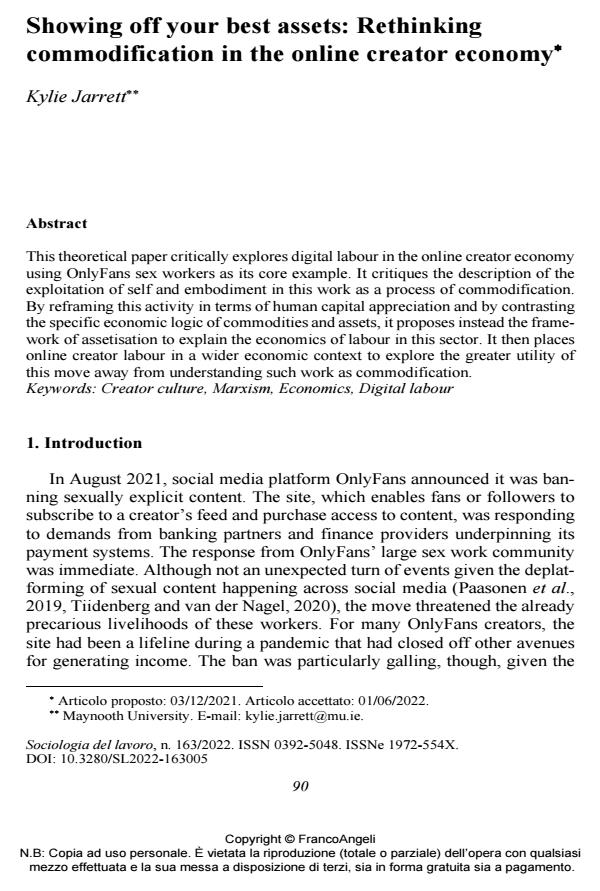Showing off your best assets: Rethinking commodification in the online creator economy
Titolo Rivista SOCIOLOGIA DEL LAVORO
Autori/Curatori Kylie Jarrett
Anno di pubblicazione 2022 Fascicolo 2022/163
Lingua Inglese Numero pagine 20 P. 90-109 Dimensione file 232 KB
DOI 10.3280/SL2022-163005
Il DOI è il codice a barre della proprietà intellettuale: per saperne di più
clicca qui
Qui sotto puoi vedere in anteprima la prima pagina di questo articolo.
Se questo articolo ti interessa, lo puoi acquistare (e scaricare in formato pdf) seguendo le facili indicazioni per acquistare il download credit. Acquista Download Credits per scaricare questo Articolo in formato PDF

FrancoAngeli è membro della Publishers International Linking Association, Inc (PILA), associazione indipendente e non profit per facilitare (attraverso i servizi tecnologici implementati da CrossRef.org) l’accesso degli studiosi ai contenuti digitali nelle pubblicazioni professionali e scientifiche.
This theoretical paper critically explores digital labour in the online creator econo-my using OnlyFans sex workers as its core example. It critiques the description of the exploitation of self and embodiment in this work as a process of commodifica-tion. By reframing this activity in terms of human capital appreciation and by contrasting the specific economic logic of commodities and assets, it proposes in-stead the framework of assetisation to explain the economics of labour in this sec-tor. It then places online creator labour in a wider economic context to explore the greater utility of this move away from understanding such work as commodifica-tion.
Questo contributo teorico esplora in modo critico il lavoro digitale nell’economia dei creatori online utilizzando le prostitute di OnlyFans come sue riferimento principale. Esso critica la descrizione dello sfruttamento del sé e della personificazione in questo lavoro come processo di mercificazione. Riformulando quest’attività in termini di rivalutazione del capitale umano e contrastando la logica economica specifica delle merci e degli asset, l’articolo propone invece il quadro dell’assetizzazione per spiegare l’economia del lavoro in questo settore. Quindi, colloca il lavoro dei creatori online in un più ampio contesto economico al fine di esplorare l’utilità che deriva dall’allontanamento concettuale di questo tipo di lavoro dall’analisi dei fenomeni di mercificazione.
Parole chiave:cultura creatrice, marxismo, economia, lavoro digitale
- LGBTQ+ Affirmative Counseling Bianca Augustine, T’Airra Belcher, Anthony Vajda, Jeffry Moe, pp.251 (ISBN:9781009342407)
- Speculative labour: The financialized imagination of creative work and the assetization of digital art through non-fungible tokens (NFTs) Ana Alacovska, Christian Fieseler, Victor Renza Avellaneda, in New Media & Society 14614448251317693/2025
DOI: 10.1177/14614448251317693 - Home in cybersymbiosis: making home with digital oddkin Sophia Maalsen, in Information, Communication & Society /2024 pp.1759
DOI: 10.1080/1369118X.2024.2311243 - Capitalism in the Platform Age Federico Chicchi, Marco Marrone, pp.115 (ISBN:978-3-031-49146-7)
Kylie Jarrett, Showing off your best assets: Rethinking commodification in the online creator economy in "SOCIOLOGIA DEL LAVORO " 163/2022, pp 90-109, DOI: 10.3280/SL2022-163005